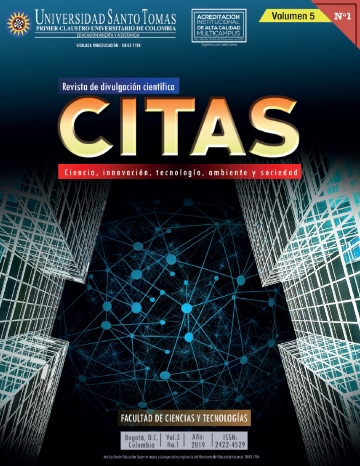Diferencias en metas académicas según género de los estudiantes de la Facultad de Ciencias y Tecnologías de la Universidad Santo Tomás
Differences in academic goals by gender of the students of the Faculty of Science and Technology of the Universidad Santo Tomás
Abstract (en)
In this article, is presented a panorama about the differences in the academic goals that the students of the Faculty of Science and Technology of the University Santo Tomás consider according to their gender. To this end, the academic goals are considered as the reasons that students have to guide their learning, the CEMA academic goal assessment questionnaire designed by T. Hayamizu and B. Weiner (1991) is used and for the analysis of the data the test t-student to determine if there are statistically significant differences.
Abstract (es)
En este artículo se presenta un panorama so- bre las diferencias en las metas académicas que se plantean los estudiantes de la Facultad de Ciencias y Tecnología de la Universidad Santo Tomás, de acuerdo a su género. Para ello se consideran las metas académicas, así como los motivos que tienen los estudiantes para orientar su aprendizaje; se utiliza el cuestiona- rio de evaluación de metas académicas CEMA diseñado por T. Hayamizu y B. Weiner (1991), y para el análisis de los datos se hizo uso de la prueba t-Student para determinar si existen diferencias estadísticamente significativas.
References
Anderman, L. H. & Anderman, E. M. (1999). Social predictors of changes in students’ achievement goal orientation. Contemporary Educational Psychology, 25, 21-37. DOI: 10.1006/ceps.1998.0978
Burgner, D. & Hewstone, M. (1993). Young children’s causal attributions for success and failure: ‘Self-enhancing’ boys and ‘self-derogating’ girls. British Journal of Developmental Psychology, 11, 125-129. DOI: 10.1111/j.2044-835X.1993.tb00592.x
Delgado, B. Inglés, C., García-Fernández, J., Castejón, J. & Valle, A. (2010). Diferencias de género y curso en metas académicas en alumnos de educación secundaria obligatoria. Revista Española de Pedagogía, 245, 67-84.
Georgiou, S. N. (1999). Parental attributions as predictors of involvement and influences on child achievement. British Journal of Educational Psychology, 69, 409-429. DOI:10.1348/000709999157806
González, J. A. & Nuñez, J. (1997). Determinantes personales del aprendizaje y rendimiento académico. En J. N. García (coord.). Instrucción, aprendizaje y dificultades, (pp. 97-144). Barcelona: Ediciones Librería Universitaria.
Hayamizu, T. & Weiner, B. (1991). A test Dweck’s model of achievement goals as related to perceptions of ability. Journal of Experimental Education, 59, 226-234
Pintrich, P. R. (2000). The role of goal orientation in self-regulated learning. En M. Boekaerts, P.R Pintrich & M. Zeidner (eds.), Handbook of self-regulation: Theory, research and applications (p. 451-502). San Diego, CA: Academic Press.
Pintrich, P. & De Groot, E. (1990). Motivational and self-regulated learning components of classroom academic performance. Journal of Educational Psychology, 82, 33-40
How to Cite
License
The authors sign a transfer of rights so that Universidad Santo Tomás can publish the articles under the conditions described below. The authors, readers and other users are free to share, copy, distribute, perform and publicly communicate the work under the following conditions:
-
Attribution — You must give appropriate credit, provide a link to the license, and indicate if changes were made. You may do so in any reasonable manner, but not in any way that suggests the licensor endorses you or your use.
-
NonCommercial — You may not use the material for commercial purposes.
-
ShareAlike — If you remix, transform, or build upon the material, you must distribute your contributions under the same license as the original.
No additional restrictions — You may not apply legal terms or technological measures that legally restrict others from doing anything the license permits.
CITAS is licensed under Creative Commons Attribution-NonCommercial-ShareAlike 4.0 International (CC BY-NC-SA 4.0).

Until 2019 the documents published in the magazine were under the Creative Commons Attribution-ShareAlike license (CC BY-SA), however, in order to guarantee the open and free distribution of the content published in the magazine, it was decided to change the type Commons Attribution-NonCommercial-ShareAlike 4.0 International license (CC BY-NC-SA 4.0)






